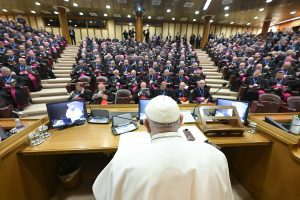VATICAN CITY (CNS) – The Catholic Church’s synodal path, the church-wide listening and dialogue process currently approaching its second assembly in October, must become a model for all Catholic dioceses and parishes, Pope Francis said.
Opening the general assembly of the Italian bishops’ conference in the Vatican synod hall May 20, the pope spent an hour and a half answering questions posed to him by some 200 bishops on global issues, from migration to rising antisemitism, as well as problems within the church such as falling vocation rates and the merging of dioceses, according to reports by Italian Catholic media.

Bishop Antonio De Luca of Teggiano-Policastro in central Italy told Avvenire, the newspaper of the Italian bishops’ conference, that Pope Francis “asked us to encourage the synodal way so that it may become a paradigm in dioceses and parishes.”
During the closed-door meeting, the pope said pastors must approach the current era of change in society not with sadness but with a renewed energy since the Lord does not abandon his church, Avvenire reported.
The assembly’s primary focus was on the synodal path, particularly its upcoming “prophetic phase” in preparation for the general assembly of the Synod of Bishops in October.
Bishop Mario Toso of Faenza-Modigliana in northern Italy said the recent “ad limina” by Italian bishops offered Pope Francis material for reflection regarding the merging of dioceses, a consideration frequently brought up by the bishops in their meeting with the pope. “It is not necessarily the case that this should be the way forward in the future,” he said.
The pope also addressed the issue of seminary restructuring, advocating for regional or interdiocesan seminaries where the number of seminarians is too low to allow for individual diocesan seminaries and to ensure better formation and community life for future priests.
Vatican News reported that Pope Francis responded to bishops who asked about the lack of consecrated religious in their communities by highlighting the example of the church in Latin America, where religious sisters and laypeople are deeply engaged in organizing community life.
The bishops said declining vocations and aging clergy were also concerns raised during the meeting. Pope Francis encouraged them not to view these challenges catastrophically but to approach them with hope and creativity, highlighting the importance of supporting and accompanying priests who need encouragement and assistance in navigating contemporary cultural changes.
The pope gave each of the bishops a copy of his book, “Holy, not Worldly,” which collects his reflections on spiritual worldliness and the need for a humble and service-oriented church.
